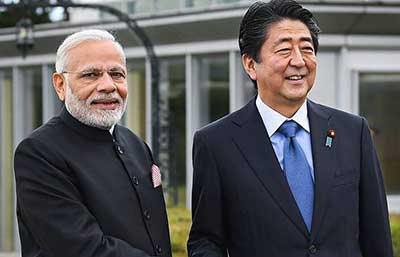Relevance: GS-2: Bilateral Agreements involving India and/or affecting India’s interests.
Key Phrases: Abenomics, Womenic, Proactive Pacifism, Japanese Self-Esteem, Arc of Freedom and Prosperity, QUAD, CEPA, The Five Eyes Alliance;
Context
- The passing of Former Japanese Prime minister Shinzo Abe calls us to reminisce about his contribution to making Japan geopolitically relevant, establishing principles of social justice and rebuilding Indo-Japan ties.
Key Highlights
Rise of Shinzo Abe as a career politician
- He won elections 6 times in his long career.
- He served as a prime minister 3 times
- First time he was elected in 2006 but he resigned in 2007.
- Then he got elected in 20012 and 2014 and served as PM from 2012 till 2020.
Contributions to Japan
Economic Front
- He popularised ‘Abenomics’.
- This involves a mix of bold quantitative easing, fiscal spending, and structural reforms.
- This rekindled the growth in initial terms of getting elected.
- He addressed the issues of a shrinking labour force by revising
migration and gender policies.
- He started ‘Womenics’.
- This involved government’s preferential treatment to the companies as a reward for hiring women.
- Creation of government-funded daycare centres.
- These moves helped the Japanese companies to question their deeply entrenched biases.
- He started ‘Womenics’.
Security Front
- He increased defence spending and was unapologetic about the need for Japan to enhance its power projection capabilities.
- Under his regime, the Japanese constitution was reinterpreted to allow Japanese soldiers to fight on foreign soil to protect friendly countries.
- He nudged Japanese politicians to embrace Proactive Pacifism
- His actions were not synonymous with reviving Japanese Militarism but to restore ‘Japanese Self-Esteem’.
Geopolitical Front
- He was the 1st one to have a vision of the Indo-Pacific before the importance of this region became clear on the geostrategic front.
- He increased Japanese significance geopolitically by increasingly
forming alliances with like-minded countries.
- It has reached a level where Japan’s membership in the 5-Eyes alliance is being discussed.
- He balanced ties with the protectionist and transactional US (under Trump Administration).
Contribution to Indo-Japan ties
- Gave a new momentum to Indo-Japan ties
- He became the 1st Japanese PM to visit India thrice in a single term.
- Recognition of India as a responsible nuclear power by signing a
civil nuclear pact in 2016
- This represented a shift. As Japan heavily criticised India after the Pokhran II tests in 1998 and maintained US-led sanctions by stopping various developmental loans.
- Joint efforts of Indo-Japan Ties
- AAGC - Asia Africa Growth Corridor with which India and Japan are taking efforts in building developmental infrastructure in African nations and in South Asian Countries.
- QUAD was revived in 2017.
- Developmental Loans to India
- Delhi Mumbai Industrial Corridor.
- Mumbai-Ahmedabad Bullet Train.
- Vision for India’s position in Indo-Pacific Strategy
- He regarded India as an important and equal partner in making Indo-Pacific an “Arc of Freedom and Prosperity”.
- 2 democratic nations with similar world outlooks could work together to evolve Indo-Pacific into an immense network spanning the entirety of the Pacific Ocean, incorporating the US and Australia, where openness and transparency will be inherent in a network to allow people, goods, capital and knowledge to flow freely.
- He was the chief guest on Republic Day of 2014, the 1st Japanese
PM to do so.
- This was significant as Japan practices pacifism and maintains distance from the display of arms and military power.
Indo-Japan Ties
Evolution
- India was not a signatory to San Francisco Peace Treaty (1951)
which was signed between the allies and the defeated countries from the
Axis power
- Rather, India signed its separate peace and bilateral treaty with Japan.
- This built a bonhomie between India and Japan.
- Radhabinod Pal’s dissenting judgement in Tokyo War Crimes Tribunals is still seen in a positive light amongst Japanese vis-a-vis India.
- India was 1st country overseas to accept bilateral aid from Japan.
- Various innovation and skill training were provided by Japan to
Indians
- The first Doordarshan Engineers were trained in Japan.
- The first people’s car was developed due to a partnership between Maruti and Suzuki.
Areas of Cooperation
- Economic and Commercial Relations
- Both the countries have signed CEPA (Comprehensive Economic Partnership Agreement).
- Japan is one of the largest FDI donors in India and provides loans through the Japanese ODA (Official Developmental Assistance).
- SCRI - Supply Chain Resilience Initiative is a joint initiative between India, Japan and Australia which aims to enhance resilience in supply chains against shocks.
- Defence and Security Cooperation
- G4 - India and Japan along with Germany and Brazil are campaigning for the expansion of the UNSC and being inducted as permanent members.
- 2+2 ministerial dialogue for enhancing defence and foreign relations.
- QUAD for free, open and inclusive Indo-Pacific.
- Military exercises such as Shinyu Maitri, Dharma-Guardian, etc
- Skill Development
- A Labour deficient Japan has opened up 12 JIIM (Japan-India Institute of Management) to train 30K youth in Japanese manufacturing.
- Cooperation in Frontier and Emerging tech
- LUPEX mission
- Digital partnership
- India-Japan Emerging Technology and Innovation Fund for Startups in AI and IoT
- Cultural
- Buddhist Diplomacy
- Partner City/Sister City Affiliation Agreement - Varanasi and Kyoto
Challenges
- CEPA hasn’t significantly increased India’s exports.
- Balance of Trade is negative for India.
- Frequent non-tariff barriers put up by Japan.
Source: ORF-Online Indian Express
Mains Question:
Q. Highlight the importance of (Late) Former PM Shinzo Abe in Indo-Japan ties? Also mention challenges of Indo-Japan ties and suggest a suitable way forward.







